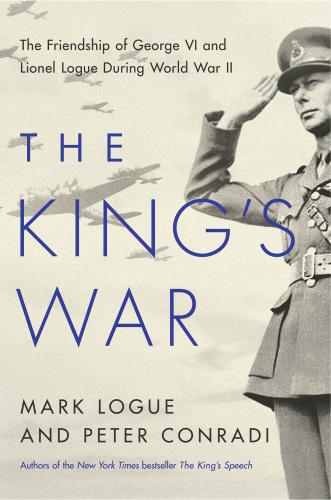
The King's War
- اطلاعات
- نقد و بررسی
- دیدگاه کاربران
نقد و بررسی

July 1, 2019
A wartime sequel to Logue and Conradi's The King's Speech (2010). Logue, whose father inherited the private papers that Australian-born speech therapist Lionel Logue kept over the nearly quarter-century of his working (and friendly) relationship with King George VI, finally sifted through the rich cache just before the film version of The King's Speech was completed. The material that the author found would influence the film's essential detail of the relationship between the two. Logue realized how loyal his grandfather had been in keeping private the work he and the king were doing to perfect the king's speech, especially during the key war years. He also realized how essential Lionel's assistance had been in bolstering the king's public image, particularly after the fresh abdication of his more popular brother, Edward VIII, in 1936. As the second son, George ("Bertie") was never meant to be king, and his speech impediment was a source of early humiliation and shame. After visiting numerous doctors (nine by one count), Bertie arrived for a first visit at Lionel's London office on Harley Street in 1926 and made great strides by following the unorthodox breathing techniques of the not-quite-doctor and fairly untrained Logue (there was no such discipline as "speech therapy" at the time), who also recognized the psychological component to stuttering. Logue and Conradi swiftly move through the war years, providing fascinating details about how the British coped through the Battle of Britain--and the meaning for regular Britons that their royalty suffered along with them. When radio formed their major community contact, the speeches by the king--practiced by him and Logue, who eliminated difficult words and replaced them with deliberate phrasing--proved to be a salve to the public and inspired resolve. A fresh-feeling account of the war years in London and the sympathy the public held for their royal family.
COPYRIGHT(2019) Kirkus Reviews, ALL RIGHTS RESERVED.

July 8, 2019
This touching and nostalgic work, a follow-up to The King’s Speech, continues the tale of the unconventional relationship between Australian speech therapist Lionel Logue and King George VI. Drawing on letters and diary entries, Logue (Lionel’s grandson) and Sunday Times journalist Conrad take readers though the long, dark, bitter days of WWII. Faced with difficult wartime decisions, constant radio addresses, and parliamentary appearances, King George VI, “Bertie,” once again turns to his speech therapist and confidant, Logue. The authors intimately depict the two men writing and preparing addresses to a nation depressed by the Nazi invasion of France, relieved at the escape of Dunkirk, besieged by the constant bombing of London, and, ultimately, triumphant about the events in Normandy. Broadcasting from a dark bomb shelter beneath Buckingham Palace, Bertie, a man once beset by a stammer and fear of public address, becomes a confident and reassuring king capable of bolstering and calming his subjects. The authors also recount Lionel and his wife Myrtle’s wartime and postwar experiences: rationing, the Nazi bombings, the enlistment of their three sons, and eventually their respective deaths in 1945 and 1953, respectively. Fans of The King’s Speech will be thrilled with this poignant sequel. Agent: Rebecca Folland, Hodder.

Starred review from October 1, 2019
George VI and his speech therapist Lionel Logue were the subjects of Logue and Conradi's best-selling The King's Speech and later the award-winning film adaptation. Here, Logue, a grandson of Lionel, and Conradi follow-up that earlier work with a sequel that chronicles the relationship and mutual respect between the men, as Lionel continued to assist the king in preparing speeches during World War II. Drawing on extensive research, the authors begin with an account of the funeral of George VI, and proceed to describe pivotal events of World War II--the 1939 London blackouts, the Battle of Dunkirk in 1940, D-day in 1944--as the backdrop of the continued friendship. Other compelling characters are profiled, including then-Princess Elizabeth, who won Lionel's admiration with her first speeches; Winston Churchill, during his tenure as prime minister during the war; and the Duke and Duchess of Windsor, who were navigating negative publicity. Overall, this intriguing work offers firsthand accounts of the experiences of the king and his family. VERDICT Highly recommended for readers of British history; the history of royalty, especially the Windsors; and above all, the events following The King's Speech.--Lucy Heckman, St. John's Univ. Lib., Queens Village, NY
Copyright 2019 Library Journal, LLC Used with permission.




دیدگاه کاربران